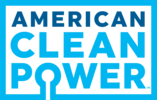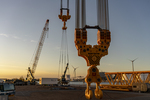News Release from American Clean Power Association (ACP)
Wind Industry Profile of
03/02/2011
USA - AWEA statement on Department of Interior release of wind energy guidelines and Eagle Conservation guidance
John Anderson, Director of Siting Policy at the American Wind Energy Association, commented today on the release by the Department of Interior of draft Wind Energy Guidelines and Eagle Conservation Guidance:
"The wind energy industry shares the goals of the Department of Interior and Fish and Wildlife Service to responsibly site projects and protect wildlife. Our commitment is reflected in a history of proactively collaborating to resolve wildlife issues through such efforts as the Bats and Wind Energy Cooperative, the American Wind Wildlife Institute, the National Wind Coordinating Collaborative, and other forums. And, we will continue to be proactive in seeking solutions to common issues and improving siting practices as the industry continues to evolve and grow.
In response to the draft documents released today by the U.S. Fish and Wildlife Service, Anderson said, "while AWEA is still in the process of reviewing the details, based on a quick review and feedback we've received from the development community, we expect to take issue with elements of the guidance materials. We are concerned that portions of these proposals will negatively impact development from the standpoint of commercial viability and lack the flexibility to allow industry professionals to best site projects in the most efficient manner while continuing to achieve the shared goal of protecting wildlife and their habitats."
"All human activity, including all forms of energy production, communication, transportation, expansion of agricultural lands, and urban sprawl, has an impact on the natural environment and our common goal should be to find a balance in protecting wildlife resources while responding to the needs of our society. It is AWEA's belief that wind energy represents the best solution for achieving that goal. Based on over a decade of robust post-construction survey data that has been collected from wind facilities across the nation, it is industry's position that the wind industry is not having a significant impact on sensitive wildlife or their habitats, and that the impacts that are documented are not only offset by the benefits of wind energy but also far exceeded by other forms of energy production. In fact, wind energy is one of the most environmentally-friendly means of generating electricity. It will continue displacing emissions of air toxins, greenhouse gases, and other pollutants from fossil fuels that threaten wildlife and the natural environment, which the conservation community and scientists worldwide view as a far greater threat to wildlife and their critical habitats."
"We will provide detailed comments during the 90-day public comment period following the publication of the guidance documents in the Federal Register."
AWEA is the national trade association of America's wind industry, with more than 2,500 member companies, including global leaders in wind power and energy development, wind turbine manufacturing, component and service suppliers, and the world's largest wind power trade show. AWEA is the voice of wind energy in the U.S., promoting renewable energy to power a cleaner, stronger America. Look up information on wind energy at the AWEA Web site. Find insight on industry issues at AWEA's blog Into the Wind. Join AWEA on Facebook. Follow AWEA on Twitter
For more information on this article or if you would like to know more about what www.windfair.us can offer, please do not hesitate to contact Errol Stryker at es@windfair.us
www.windfair.net is the largest international B2B Internet platform – ultimately designed for connecting wind energy enthusiasts and companies across the globe!
"The wind energy industry shares the goals of the Department of Interior and Fish and Wildlife Service to responsibly site projects and protect wildlife. Our commitment is reflected in a history of proactively collaborating to resolve wildlife issues through such efforts as the Bats and Wind Energy Cooperative, the American Wind Wildlife Institute, the National Wind Coordinating Collaborative, and other forums. And, we will continue to be proactive in seeking solutions to common issues and improving siting practices as the industry continues to evolve and grow.
In response to the draft documents released today by the U.S. Fish and Wildlife Service, Anderson said, "while AWEA is still in the process of reviewing the details, based on a quick review and feedback we've received from the development community, we expect to take issue with elements of the guidance materials. We are concerned that portions of these proposals will negatively impact development from the standpoint of commercial viability and lack the flexibility to allow industry professionals to best site projects in the most efficient manner while continuing to achieve the shared goal of protecting wildlife and their habitats."
"All human activity, including all forms of energy production, communication, transportation, expansion of agricultural lands, and urban sprawl, has an impact on the natural environment and our common goal should be to find a balance in protecting wildlife resources while responding to the needs of our society. It is AWEA's belief that wind energy represents the best solution for achieving that goal. Based on over a decade of robust post-construction survey data that has been collected from wind facilities across the nation, it is industry's position that the wind industry is not having a significant impact on sensitive wildlife or their habitats, and that the impacts that are documented are not only offset by the benefits of wind energy but also far exceeded by other forms of energy production. In fact, wind energy is one of the most environmentally-friendly means of generating electricity. It will continue displacing emissions of air toxins, greenhouse gases, and other pollutants from fossil fuels that threaten wildlife and the natural environment, which the conservation community and scientists worldwide view as a far greater threat to wildlife and their critical habitats."
"We will provide detailed comments during the 90-day public comment period following the publication of the guidance documents in the Federal Register."
AWEA is the national trade association of America's wind industry, with more than 2,500 member companies, including global leaders in wind power and energy development, wind turbine manufacturing, component and service suppliers, and the world's largest wind power trade show. AWEA is the voice of wind energy in the U.S., promoting renewable energy to power a cleaner, stronger America. Look up information on wind energy at the AWEA Web site. Find insight on industry issues at AWEA's blog Into the Wind. Join AWEA on Facebook. Follow AWEA on Twitter
For more information on this article or if you would like to know more about what www.windfair.us can offer, please do not hesitate to contact Errol Stryker at es@windfair.us
www.windfair.net is the largest international B2B Internet platform – ultimately designed for connecting wind energy enthusiasts and companies across the globe!
- Source:
- AWEA
- Author:
- Posted by Trevor Sievert, Online Editorial Journalist
- Email:
- windmail@awea.org
- Link:
- www.awea.org/...
- Keywords:
- AWEA; wind energy, wind power, wind turbine, onshore, offshore, windmill, www.windfair.net, Trevor Sievert, ECA


























